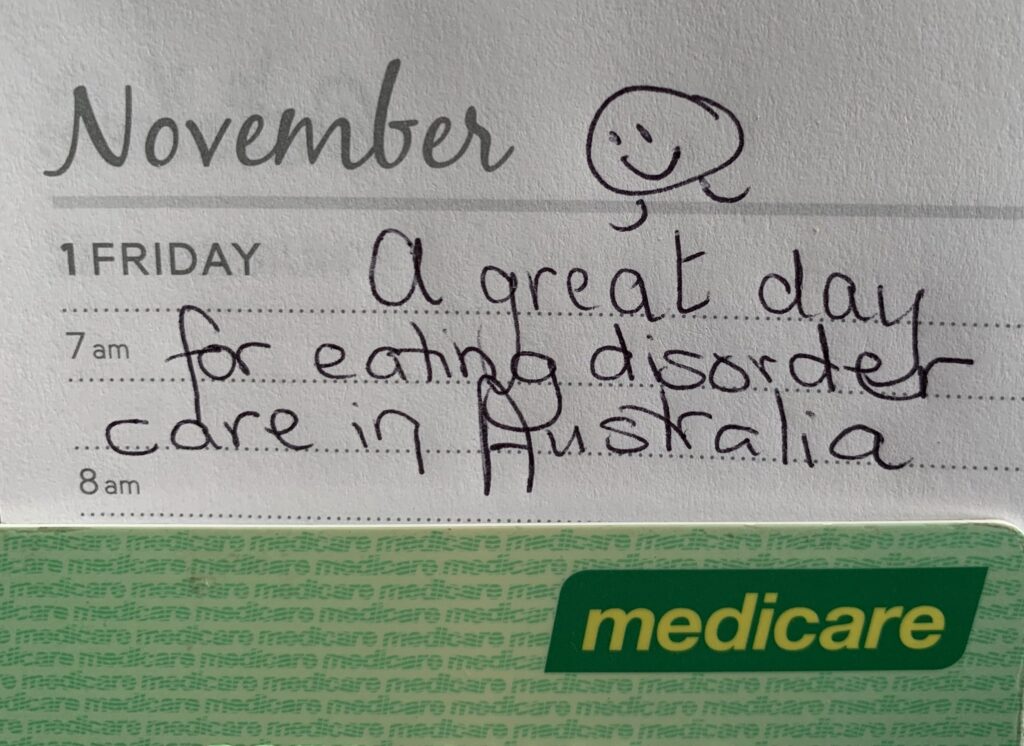More Medicare support for Australians with eating disorders

More Medicare support for Australians with eating disorders
By Dr. Anthea Fursland
Australians with an eating disorder are about to gain greater access to Medicare reimbursed evidence-based treatment. This is an enormous step forward and will benefit many people with eating disorders. A huge amount of work has gone into this change, and we have to thank the National Eating Disorders Collaboration and Federal Health Minister Greg Hunt for their courageous actions in facilitating this increased access.
We know that eating disorders are particularly complex, since they exist at the interface of medical and mental health. We know that many people with eating disorders suffer in silence, never seeking help – because of shame, confusion, fear or hopelessness. We know that most people who do receive treatment receive outpatient therapy. We know that there are evidence-based treatments which benefit many.
We know that medical symptoms can have lasting effects such as bone loss, dental erosion and brain changes, and that both medical and psychiatric symptoms can have lasting effects such as poor performance at work/studies, reduced self-esteem and loss or deterioration of relationships. We know that early intervention is crucial in halting the mental, physical and social deterioration. We know that early change predicts the likelihood of recovery/symptom reduction.
We know that evidence-based treatments, which advocate early change, are recommended across the board by respected specialists in eating disorders. We also know that very few mental health clinicians offer evidence-based treatments, and that many people have been “in treatment” for years, without any focus on symptom change, while their mental and physical health continue to deteriorate.
Implicit and even explicit in the new changes to Medicare is that the increased access to care means access to treatment that is eating disorder-specific and conducted by practitioners who are suitably trained in evidence-based therapy. However, at present there are no criteria to ensure or monitor this.
Immediate challenges to the eating disorder field include:
- Raising the general level of competency in clinicians providing eating disorders treatment; and
- Raising awareness among the general public so people can make the best treatment choice for themselves and/or their loved ones.
What are the changes?
From November 1, 2019, a new suite of 64 Medicare Benefits Schedule (MBS) items will be introduced to support a model of best practice evidence-based care for patients with anorexia nervosa and other eligible patients with eating disorders.
- The listing of these new items is a result of recommendations in 2018 by the independent clinician-led Medical Benefits Schedule (MBS) Review Taskforce and the Australian Government’s response to those recommendations.
- This new item structure means eligible patients will be able to receive a Medicare rebate when eligible providers undertake the development of an Eating Disorder treatment and management plan or a review which will activate:
- a course of evidence-based eating disorder psychological treatment services (up to a total of 40 psychological services in a 12-month period); and
- up to 20 dietetic services, in a 12-month period, depending on their treatment needs.
- It is intended that the MBS services will be provided by practitioners with the knowledge, skills and experience in providing treatment to patients with eating disorders.
- Treatment provided under the Eating Disorder Psychological Treatment items are limited to the defined list of evidence-based eating disorder specific treatments.
- The Better Access to Mental Health treatment pathway under the MBS remains for all patients who do not fit the eligibility criteria for the MBS Eating Disorders Treatment Pathway.
- There will be an evaluation of the new items after 12 months to assess if the items are operating as intended for patients, providers and the Government.
From http://www.mbsonline.gov.au/internet/mbsonline/publishing.nsf/content/Factsheet-EatingDisorders
These changes are relevant for medical practitioners (including a GP, a psychiatrist or paediatrician), and eligible Clinical Psychologists and Psychologists, Occupational Therapists, Social Workers and Dietitians.
This is ALL that has been confirmed, but various organisations have been involved in negotiations with Medicare, so everything below is subject to change/confirmation.
What does this mean?
From November 1, 2019, people with anorexia nervosa and other patients who are eligible* will be able to access more care than the current amount of up to 10 for mental health sessions and up to five sessions for dietetics. They will be able to access up to 40 psychological sessions and up to 20 dietetic sessions in a 12-month period.
*Eligibility criteria are determined from the government’s explanatory notes available here: https://gallery.mailchimp.com/ce93a8232809a8991d86defc6/files/6e0a0628-7c82-4c1b-a434-fdd6358fee7b/Eating_Disorders_Explanatory_Notes_as_at_15_October_2019.pdf
‘Eligible patient’ defines the group of patients who can access the new eating disorder services. There are two cohorts of eligible patients.
- Patients with a clinical diagnosis of anorexia nervosa; or
- Patients who meet the eligibility criteria (below), and have a clinical diagnosis of any of the following conditions:
-
- bulimia nervosa;
- binge-eating disorder; or
- other specified feeding or eating disorder.
The eligibility criteria for a patient is:
- a person who has been assessed as having an Eating Disorder Examination Questionnaire score of 3 or more;
- the condition is characterised by rapid weight loss, or frequent binge eating or inappropriate compensatory behaviour as manifested by 3 or more occurrences per week; and
- a person who has at least two of the following indicators:
- clinically underweight with a body weight less than 85% of expected weight where weight loss is directly attributable to the eating disorder;
- current or high risk of medical complications due to eating disorder behaviours and symptoms;
- serious comorbid medical or psychological conditions significantly impacting on medical or psychological health status with impacts on function;
- the person has been admitted to a hospital for an eating disorder in the previous 12 months;
- inadequate treatment response to evidence based eating disorder treatment over the past six months despite active and consistent participation.
Practitioners should have regard to the relevant diagnostic criteria set out in the Diagnostic and Statistical Manual of the American Psychiatric Association – Fifth Edition (DSM-5). Practitioners can access the Eating Disorder Examination Questionnaire at https://www.credooxford.com/pdfs/EDE_17.0D.pdf.
How will it work?
Psychological treatment
Those who are eligible will be able to access up to 40 sessions with Clinical Psychologists and Psychologists, Occupational Therapists and Social Workers (those who have a Medicare number – i.e., are registered as Medicare providers). As a first step, people must go to their GP and ask for psychological treatment for their eating disorder.
- If they DO NOT meet criteria for the new eating disorder pathway, treatment will proceed as before:
- The GP will create a GP Mental Health treatment plan for up to six psychological treatment sessions.
- The GP will review the case and can approve up to four additional services.
- The GP will again review the case.
- During any of this time, the mental health clinician can make an assessment of whether the patient meets the new eating disorder pathway criteria and make a recommendation to the GP.
- If people DO meet criteria for the new eating disorder pathway, treatment will proceed as follows:
- At the start:
- The GP or psychiatrist or paediatrician creates an Eating Disorders Plan
- The patient receives up to 10 Eating Disorders Psychological Treatment (EDTPT) sessions.
- The EDPT clinician reports back to the GP.
- After 10 sessions: To be eligible to receive more than 10 EDPT sessions, the GP conducts a review and can approve up to 10 additional EDPT sessions.
- After 20 sessions: To be eligible to receive more than 20 EDPT sessions, the patient must be reviewed by both their GP and a specialist: either psychiatrist or paediatrician. Note – this appointment may take time and be difficult to arrange, so needs to be planned ahead.
- The patient receives up to 10 additional EDPT sessions (up to a total of 30 in 12 months).
- The EDPT clinician reports back to the GP.
- After 30 sessions: The GP conducts a review and can approve up to 10 additional EDPT sessions (up to a total of 40 in 12 months).
- The EDPT clinician reports back to the GP.
- At the start:
Dietetic treatment
If people DO meet criteria for the new eating disorder pathway, treatment will proceed as follows:
- The GP creates an Eating Disorder Plan, or the psychiatrist creates an Eating Disorder Plan, or the paediatrician creates an Eating Disorders Plan.
- Patient receives up to 20 dietetic sessions in 12-month period.
- The dietitian reports back (mandatory) after 1st
- The dietitian reports back to the GP as requested by the referring practitioner or as clinically indicated.
- The dietitian reports back (mandatory) after 20th
Best practice evidence-based care
The changes to the Medicare system have been made so that people with eating disorders receive “best practice evidence-based care”. What does this mean?
“Evidence-based care” refers to treatments that have been researched, with results published in peer-reviewed scientific journals. They are regarded as the first-line treatments for eating disorders, as they have been shown to be beneficial. These treatments tend to have a manual to guide the clinician, and these treatments require specialist training. The trainings should be at least two days’ duration, with adequate opportunity to practice skills, so that the clinician is able to apply these skills when treating people with eating disorders.
A recent publication from the government Health Insurance (Allied Health Services) Amendment (Eating Disorders) Determination 2019 https://www.legislation.gov.au/Details/F2019L01315) sets out the following requirement for allied health services:
…. an eating disorder psychological treatment service must involve the provision of any of the following mental health care management strategies:
-
- family based treatment (including whole family, parent based therapy, parent only or separated therapy)
- adolescent focused therapy;
- cognitive behavioural therapy;
- cognitive behavioural therapy-anorexia nervosa;
- cognitive behavioural therapy for bulimia nervosa and binge-eating disorder;
- specialist supportive clinical management;
- Maudsley model of anorexia treatment in adults;
- nterpersonal therapy for bulimia nervosa and binge-eating disorder;
- dialectical behavioural therapy for bulimia nervosa and binge-eating disorder;
- focal psychodynamic therapy.
A further publication Health Insurance (Section 3C General Medical Services – Eating Disorders Treatment Plan and Psychological Treatment Services) Determination 2019 sets out requirements and fee schedules for medical practitioners https://www.legislation.gov.au/Details/F2019L01318.
What should people with an eating disorder be requesting of their GP?
When requiring eating disorders treatment, people need to ask their GP and/or referring practitioner (psychiatrist or paediatrician) for:
- Treatment under the new MBS scheme
- A mental health clinician who is registered with their appropriate professional body (e.g., psychologists have to be registered with APHRA, the Australian Health Practitioner registration Agency)
- Information regarding what evidence-based treatment
- Information regarding what training the clinician received





